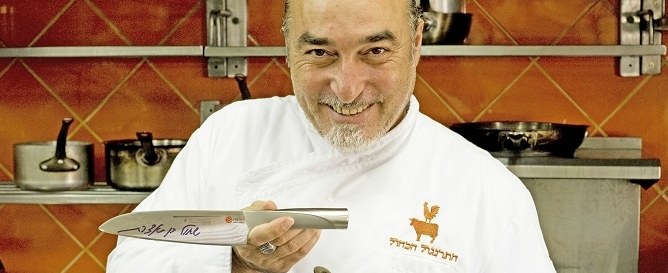‘The ambassadors can talk for a year, but one good meal does just as much good,’ says Tel Aviv chef Shaul Ben-Aderet.
Shaul Ben-Aderet’s grandmother didn’t own a television set. So when she minded him while his parents were at work, she stood him on a chair and he helped prepare Iraqi dishes in her Tel Aviv kitchen.
In a way, he’s still standing on that chair.
“When I was four or five, I already knew I would be a cook,” says Ben-Aderet, 48, owner and head chef of three Israeli restaurants. “Some children dream to be a doctor or policeman. Me — just put me in the kitchen.”
True, Grandma probably didn’t make the sort of dishes found on the menu at Kimmel, his flagship French restaurant in the trendy Tel Aviv neighborhood of Neve Tzedek: calamari stuffed with risotto and seafood in cream and garlic; chicken liver paté in calvados, honey and spiced carrot jam; flank steak in pepper, cream and bone marrow; shrimp in butter, Roquefort and nuts.
But the aroma from Ben-Aderet’s cuisine has wafted far and wide. He’s often featured on cooking shows and product promos. Israeli embassies in Brazil, Uruguay and Japan have flown him in to represent Israel at gala dinners. Last July, he and an Arab chef teamed up in an episode of the US Public Broadcasting Service show, Cuisine Culture.
And in January, he cooked a gourmet feast live on Turkish TV.
Whenever he travels, “I come wearing a chef’s shirt with the Israeli flag on it, so I feel like a minor ambassador,” he tells ISRAEL21c. “The ambassadors can talk for a year, but one good meal does just as much good.”
The producers of Israel’s Food Channel teamed up with TurkMax, a leading Turkish lifestyle channel, in their invitation to Ben-Aderet.
“Relations between Israel and Turkey are not so good right now — people are even afraid to go there — so I said to myself, ‘Why not?’ My wife, Orit, thought I was a little crazy, but that’s nothing new.”
His day in Istanbul yielded spinach shakshuka with cream; Caciocavallo cheese and truffles; squash salad with walnuts, mint, cranberries and Gorgonzola cheese; fillet of beef glazed with burned mustard and honey; and an Arab-style cake. Shakshuka is a traditional Israeli breakfast of eggs poached in a spicy tomato and vegetable sauce.
“In the show, I said I will invite the president of Turkey to come to Israel, and I will bring [Israeli President] Shimon Peres there. I said, ‘We’ll make some shakshuka and everything will be okay.’”
Beautiful Hands
Born in 1964 to parents of Iraqi and Greek descent, Ben-Aderet learned metal-working in his Tel Aviv high school because that was his father’s profession. His real education took place at the side of his maternal grandmother
"She taught me how to make everything perfect, even simple things like rice or chicken. She had beautiful hands. I always say the best cooking is not something you learn. You need the passion and the touch.”
Fresh from the army, Ben-Aderet opened an eatery in Ramat Hasharon serving staples such as hamburgers, pizza and French fries. His father helped him fix up the site, and lends his handyman’s touch to his son’s enterprises to this day. After six years, he sold the place and took Orit’s advice to renovate an Ottoman-era building in Neve Tzedek to become a French restaurant.
Opening Kimmel 19 years ago was a pretty daring move on the part of a chef who’d never been to France.
“I just read a little,” he explains. More than half the menu items have remained the same from the start; the rest were inspired by Ben-Aderet’s subsequent trips to France. With co-workers, he opened a bistro called Kimmel in the Gilboa two years ago in the Gilboa Mountains, and Blue Rooster last year in East Tel Aviv.
The three locations keep him and his wife busy all week long. “I wake up at 6 in the morning and take my children to school,” he relates. He and Orit have sons aged 17 and 13, and daughters aged 10 and seven.
“Then I come to Kimmel to cook with the staff till 1:00. I go to Blue Rooster till 3, then I rest two hours, and in the evening I am in Kimmel from 7:30 to 9, then till midnight at Blue Rooster. Saturdays I’m in Gilboa.”
Though she makes the family’s meals at home, Orit’s job at Blue Rooster is out front. “Orit knows how to take care of people,” says her husband. “They come to talk with her and see her, not only to eat.” But he’s not downplaying the importance of food. “If you want to make a contract or if you are angry with someone, if you drink and eat together everything will be okay,” he assures.









